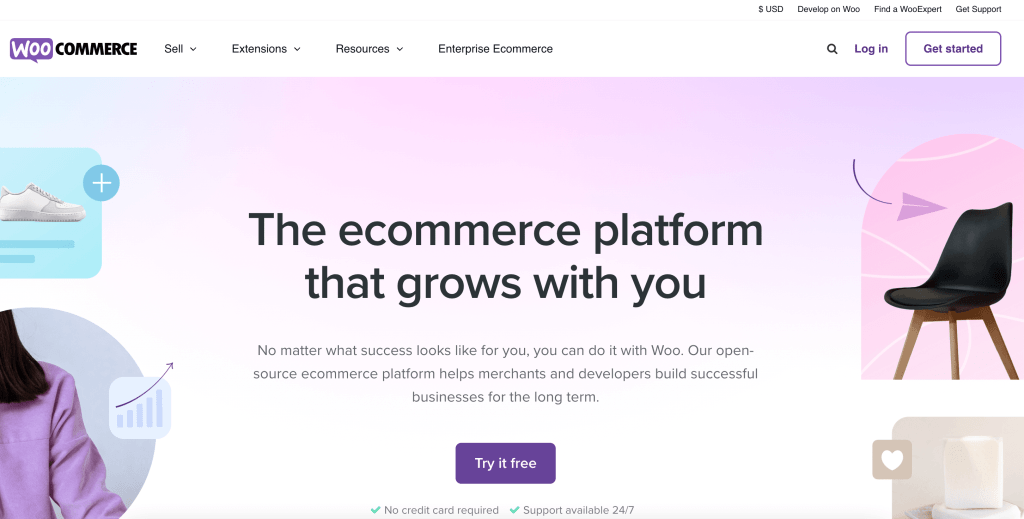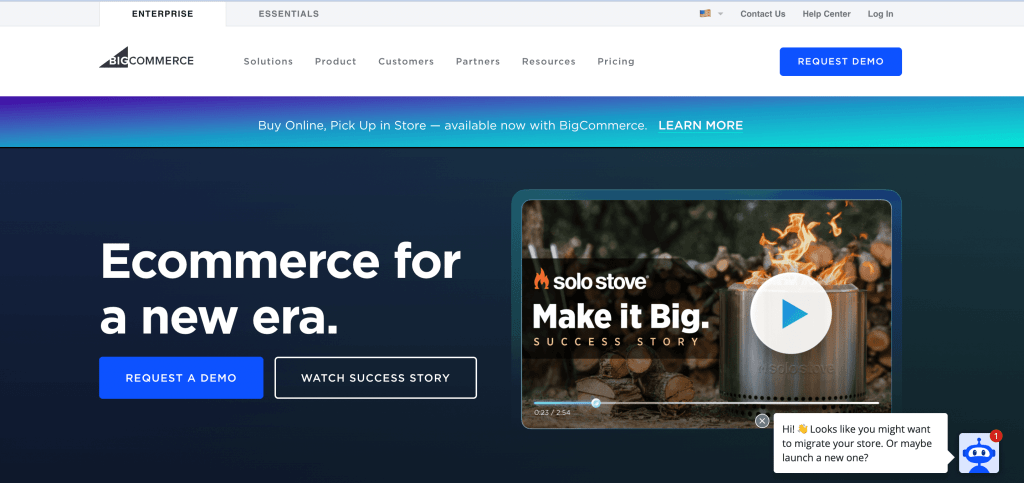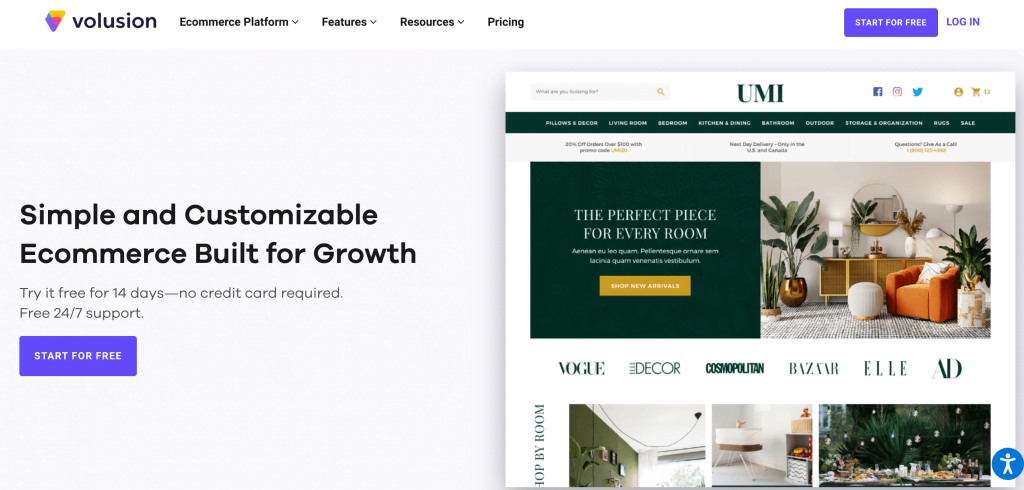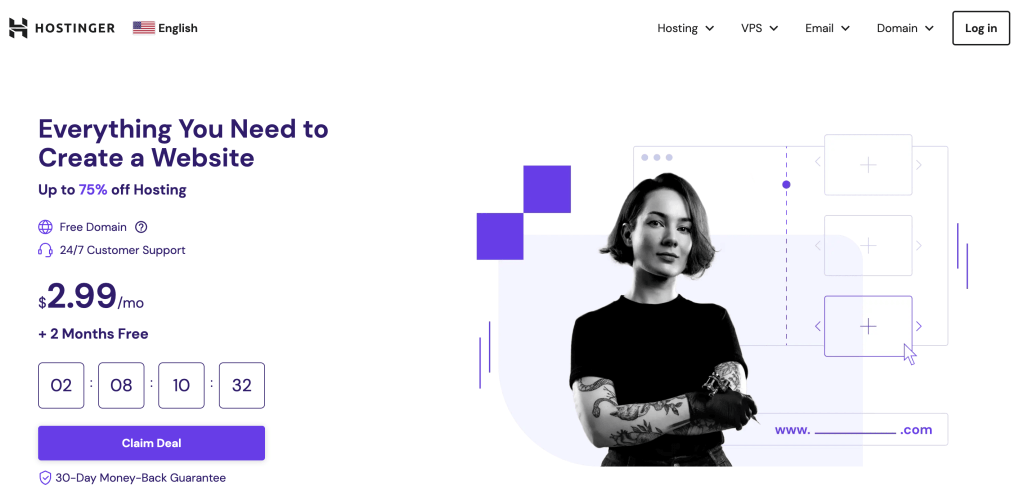The eCommerce sector is thriving and is estimated to attain a whopping $6.07 trillion by 2024.
Studies show that 175 websites are created every minute, and 252,000 new sites go online each day. Out of this number, a large share comprises eCommerce websites.
As eCommerce expands, many businesses build websites to sell their products.
But, building an eCommerce website is more challenging than it sounds. It requires a lot of time, money, and effort. For example, hiring a WordPress development company to build a custom site, or set up a SAP commerce storefront from scratch.
However for many, utilizing an eCommerce website builder will be the best option.
A website builder is a tool or software that automates building and designing an eCommerce website. It’s like having a web developer in your pocket without a steep price tag.
Here, we’ll take you through some of the most popular eCommerce website builders for 2023 and beyond.
We’ve also included a detailed review of each platform, including features, pricing, customization capabilities, and more.
8 Best eCommerce Website Builders
1. Shopify

Shopify is a powerful eCommerce website builder powering more than 4.15 million online stores worldwide. Big brands like Gymshark, Fitbit, Red Bull, etc., also use Shopify.
Aside from its widespread popularity, Shopify is renowned for its performance, comprehensive features, and intuitive interface.
One of the best aspects of Shopify is that it is less expensive than many other eCommerce platforms.
Shopify offers three different plans to fit your business’s needs. The Basic plan costs $29 per month and includes 2 staff accounts, up to 1,000 inventory locations, basic reports, etc.
In addition, you can choose from more than 100 professionally designed templates for your online store. These templates are designed to create stunning online stores that capture customers’ attention. For those looking to save on costs, there are many free Shopify themes available that still provide high-quality designs and functionality.
Shopify also provides built-in features like SSL certifications, web hosting, custom domains, abandoned cart recovery, and other helpful marketing tools.
But that’s not all! Shopify also makes selling on popular marketplaces like Amazon, eBay, and Etsy easy through native integrations.
This way, you can expand your reach and sell across multiple platforms without hassle.
You can also quickly accept payments online using Shopify Payments, which supports over 100 payment options worldwide. This includes PayPal, Apple Pay, Amazon Pay, and many others.
To customize your store even further, Shopify offers over 8,000 apps, including the best Shopify SEO apps that you can use to enhance its functionality.
Check out some growth hacks for your Shopify store.
Key Features for Shopify
- Shopify Dropshipping: You can use Shopify to set up, manage and run a dropshipping business that sells products without you having inventory or doing shipping logistics.
- Shopify POS: Use Shopify’s POS system to sell your products in-person and easily manage inventory across all channels.
- Exchange and Return Information: Create clear exchange and return policies for your customers, which will help build trust and create a positive shopping experience.
- Web Push Notifications: Use web push notifications from Shopify to engage and inform customers, sending them personalized updates and promotions directly on their browsers.
- Social Media Integration: You can use this feature to connect your Shopify store to popular social media platforms like Facebook and Instagram to drive traffic to your store.
- Cart and Checkout: Shopify’s cart and checkout features, such as one-click add-to-cart, easy checkout, and secure payment processing, are designed to make your customers’ shopping experience a seamless one.
- Multiple Payment Options: Let customers pay using their preferred payment method: credit cards, virtual credit cards, PayPal, Apple Pay, and more.
- Powerful Analytics Tools: Use Shopify’s powerful analytics tools to gain insights into your store’s performance, including detailed sales and customer behavior reports.
Shopify Pricing
There is also a transaction fee that applies to each sale made through your online store. The transaction fee for the Basic plan is 2.9% plus 30¢ per transaction.
Additionally, Shopify provides a 14-day free trial to test the software before deciding on a paid plan.
2. Wix

The platform offers various features, including a drag-and-drop editor, templates and designs, social media integration, and more.
Wix offers over 500 professionally designed templates that you can customize to match your brand perfectly. Plus, with advanced design features like animation, video backgrounds, and scroll effects, you can make your eCommerce website truly stand out.
Site customization is a breeze with Wix. The Wix Editor allows you to effortlessly modify your online store’s layout, design, colors, fonts, backgrounds, and other visual elements.
Wix doesn’t stop at just website design – it also offers robust eCommerce features—for example, store analytics, store management, automated sales tax, etc.
Wix’s embedded analytics dashboard is one of its notable features. This tool can track your sales, marketing activities, best-selling products, and more.
This valuable data empowers you to make data-driven decisions to optimize your eCommerce performance and grow your business.
Key Features for Wix
- 500+ Professional Templates: Wix offers a stunning collection of over 500 professional templates, allowing you to effortlessly create an online presence that reflects your unique style and vision.
- Extensive Media Library: Wix offers an extensive media library that includes 1 million high-resolution images from Unsplash, allowing you to easily enhance your website with visually captivating visuals.
- Multichannel Sales: Wix enables you to sell your products and services across multiple channels, reaching a wider audience and maximizing your sales potential.
- Robust Blog Platform: Wix boasts a robust blog platform that empowers you to share your thoughts, ideas, and stories with your audience.
- 50+ Secure Payment Gateways: Wix supports over 50 secure payment gateways, ensuring that customers can make purchases on your website with peace of mind.
- Currency Converter: The currency converter feature of Wix allows you to display prices in multiple currencies, catering to a diverse range of customers and making it easier for them to purchase from your site.
- Built-in SEO Tools: Wix has built-in SEO tools that optimize your website’s visibility on search engines. From meta tags to custom URLs, Wix equips you with the necessary tools to improve your website’s search engine ranking and drive more organic traffic.
- Dropshipping: Wix’s Dropshipping feature allows you to sell products without having to keep an inventory. It automates the order fulfillment process by sending orders directly from customers to your suppliers. This frees up your time so that you can focus on growing your business.
- Abandoned Cart Recovery: The cart recovery feature allows you to send automated emails to customers who have left items in their cart, encouraging them to complete their purchases and boosting your sales.
Wix Pricing
Wix offers a range of pricing plans to cater to different business needs. The plans range from $16 to $59 per month when billed annually.
The basic plan includes a free domain, removal of Wix branding, 35 GB space, unlimited bandwidth, site booster app, etc.
In addition to the monthly fees, Wix charges a standard transaction fee of 2.9% + $0.30 per order for its e-commerce plans. This fee applies to all transactions made through the Wix online store.
Wix also offers a free plan, which includes basic features and a Wix subdomain. However, this plan comes with Wix ads displayed on the website, and users cannot connect their custom domain.
3. WooCommerce

WooCommerce is another popular ecommerce website builder. It’s built on WordPress and is free to install.
It also uses the same admin panel as WordPress, so you can easily switch between your WordPress blog and WooCommerce store.
But one of the best things about WooCommerce is its customization options. You can install any plugin or theme to make your store look exactly how you want.
You can also create any layout for your store and add products in any way you want. This level of customization is not available with other website builders.
But regarding WooCommerce security, it’s important to know that your store has no built-in security. You’ll need to install additional plugins such as WordFence or Sucuri if you want any protection from hackers.
Similarly, you can install SEO plugins like Yoast or Rank Math to improve your search engine rankings.
But there’s a catch. To build an online store with WooCommerce, you’ll need a web hosting service to host your website. It’s because WooCommerce is an open-source platform and doesn’t have servers. Consider using cloud hosting services to ensure scalability, security, and high performance for your WooCommerce store. Or, consider hiring an agency or contractor to provide WooCommerce maintenance service.
So the responsibility of managing your server, website’s security, and performance lie on your shoulders (for example, using cloud monitoring tools).
Key Features for WooCommerce
- Built-in blogging: WooCommerce’s blogging capabilities allow you to share your store updates, industry news, and engaging content with customers all in one place.
- Countless themes: Choose from a vast collection of themes to create a visually stunning and unique online store that reflects your brand’s personality.
- Customer accounts and guest checkout: Let your customers create accounts or check out as guests during checkout.
- Multilingual support: With multilingual support, you can create localized shopping experiences for your customers in different languages and expand beyond borders.
- Own your data: With WooCommerce, you have complete ownership and control over your store’s data, including customer information, order details, analytics, etc.
- Built-in payment processing: WooCommerce has a built-in payment system supporting popular gateways such as PayPal, Stripe, and more. This makes it easy for your customers to make purchases and ensures smooth transactions for your online store.
- Product blocks: Product blocks create an eye-pleasing framework for showcasing your products and making them easy to locate.
- Large Library of Extensions: WooCommerce has a wide range of extensions that allow you to customize your store and make it unique. You can find extensions for almost anything, including shipping and payment processing.
WooCommerce Pricing
Although WooCommerce is free, it requires additional expenses to run an online store.
These expenses include web hosting, domain name registration, SSL certificates, payment gateway, and transaction fees. These expenses total $110 annually on average.
4. BigCommerce

BigCommerce is a leading eCommerce website builder and enterprise solution catering to the needs of fast-growing businesses.
It powers some of the most successful and highest-performing stores, including those from multinational companies like Sony, Skullcandy, Ubisoft, etc.
BigCommerce empowers users to create their online store according to their unique vision, whether running a large-scale enterprise or a small business. The platform offers an intuitive drag-and-drop interface for creating web pages and customizable theme templates to suit specific needs.
BigCommerce includes advanced features like seamless integration with popular payment gateways like PayPal, Stripe, etc. It also provides automated shipping fulfillment services that streamline order management for hassle-free customer service.
In addition to its robust eCommerce capabilities, BigCommerce provides SEO optimization tools and comprehensive performance tracking data in real-time.
This enables business owners to stand out in the competitive online marketplace, maximizing their potential for success.
Key Features for BigCommerce
- Single-Page Checkout: BigCommerce offers a streamlined, single-page checkout experience that reduces cart abandonment rates and improves conversions.
- Page Builder Visual Editor: With BigCommerce’s easy-to-use visual editor, you can easily design a website that looks great and is engaging for your customers.
- Seamlessly integrate with WordPress: BigCommerce offers seamless integration with WordPress, allowing you to combine the power of both platforms and create a dynamic online store.
- Go global with multi-language support: BigCommerce allows you to create a multilingual storefront, helping you reach customers from different regions and markets.
- Global CDN: BigCommerce’s global Content Delivery Network (CDN) provides your online store with the best shopping experience and boosts performance so that customers will enjoy fast load times no matter where customers are located.
- Staging Environment: BigCommerce’s staging environment feature allows you to test and preview changes to your online store so that updates do not negatively impact the live site.
- World-Class Uptime: BigCommerce guarantees industry-leading uptime so that your online store is always accessible to customers and minimizes downtime.
- Mobile Optimization: BigCommerce’s mobile-optimized eCommerce platform allows you to create a mobile-friendly online store easily accessible from any device.
- Digital Wallets: BigCommerce’s digital wallet allows you to accept payments on your mobile app or website via Apple Pay, Google Pay and Samsung Pay.
BigCommerce Pricing
BigCommerce offers multiple pricing plans to cater to the needs of different businesses. The pricing plans are divided into four categories: Standard, Plus, Pro, and Enterprise.
These plans have fixed monthly charges ranging from $29 to $299 per month, while the Enterprise plan is custom-priced and tailored to individual business requirements. Plus, they offer a 15-day free trial.
BigCommerce also charges a transaction fee for debit and credit card processing, which starts at 2.9% + $0.30 per payment. This fee is fairly standard and is applied to all plans.
5. Volusion

Volusion is one of the oldest and most trusted eCommerce website builders. It has established itself as a market leader in providing businesses with the tools to create and manage online marketplaces.
Volusion offers a variety of tools and resources that are tailored specifically to the needs of eCommerce-focused entrepreneurs.
For example, you can use the intuitive Drag & Drop Editor or opt for more advanced design capabilities like HTML/CSS coding.
You can also adjust colors, fonts, and logos, manage navigation, and add products hassle-free. This enables businesses to create an online store with a look and feels that differentiates them from competitors.
Plus, this platform supports integration with popular services like MailChimp, Zapier, Fomo, etc.
Another great thing about Volusion is its business analytics features. Using this feature, you can easily track your ROI based on newsletters, affiliates, purchases, and ad campaigns.
Volusion also provides free business tools such as a Terms and Conditions Generator, Small Business Loan Calculator, CPM calculator, and Barcode Generator.
These tools help users manage their online store more effectively and efficiently.
Key Features for Volusion
- Homepage Slideshow: With Volusion’s homepage slideshow feature, you can easily highlight discounts and new products directly on your homepage.
- HTML/CSS Editor Access: Get access to HTML/CSS editor and have complete control over your website’s appearance and functionality. The editor gives you the flexibility you need to realize your vision, whether you want to modify the design of your site or add custom code.
- Firewall Settings: Volusion’s customizable firewall settings allow you to block or allow specific traffic to your site. This helps you avoid spam and provides reliable tracking data.
- Inventory/Stock: With Volusion’s inventory management feature, you can easily track your products in real time. You can also manage your inventory, view your stock levels, and set up automated alerts to ensure you never run out of stock.
- Subscription-Based Products: Volusion makes managing your subscriptions simple if you sell products that require a subscription. These tasks can be done in one location, including setting up recurring payments and creating personalized subscription plans.
- Powerful SEO: Volusion’s powerful SEO tools help you to optimize your site for search engines.
- Cross-selling Functionality: The cross-selling functionality allows you to recommend related products to your customers, increasing sales and revenue.
- ROI Tracking: Volusion’s ROI tracking feature makes it easy to track your marketing campaigns and measure your return on investment.
Volusion Pricing
Volusion offers four pricing plans, ranging from $31 to $269 monthly, with a custom Prime plan option.
Volusion Payments charges a 2.15% transaction rate and has no setup fees. The service is only available in the US; eligibility must be confirmed through an application process.
A 14-day free trial is also available for users to test the platform before committing to a paid plan.
6. Shift4Shop

Looking for an eCommerce website builder that can be tailored to your exact specifications? Look no further than Shift4Shop.
This platform is perfect for individuals and businesses looking to create a custom eCommerce website.
Shift4Shop has over 200 payment options and over 200 built-in features, allowing you to create a professional-looking and fully functional eCommerce website.
Additionally, there are over 50 free themes to choose from, which can help you to match your website perfectly to your brand and style.
Setting up shipping on Shift4Shop is a breeze, thanks to its simple and flexible setup options.
This flexible platform can be used for various business models, including subscriptions, ticket sales, events, print-on-demand sales, and drop shipping.
In addition to being functional, Shift4Shop is extremely secure and optimized for SEO, so you can be confident that your website will perform well in search engines while being safe from cyber attacks.
Key Features for Shift4Shop
- Free Domain Registration: Shift4Shop gives you free domain registration when you sign up for a plan. You can also transfer your existing domain to Shift4Shop.
- Online Store Content Management System (CMS): With Shift4Shop’s intuitive CMS, you can easily manage your store’s content without any coding knowledge. You can create pages, add products, update prices, and more with a few clicks.
- QuickBooks Connector: The QuickBooks Connector lets you integrate your online store with QuickBooks, a popular accounting software, and seamlessly sync your sales and inventory data.
- Unlimited Bandwidth: Shift4Shop offers unlimited bandwidth, which means you can handle traffic to your online store without worrying about additional charges. This ensures that your store is always accessible and responsive to your customers.
- Real-Time Shipping with Label Printing: Shift4Shop’s real-time shipping integration allows you to offer accurate rates based on your customer’s location. Additionally, this integration will print labels directly from within the Shift4Shop dashboard.
- Upsell and Cross-Sell Features: Shift4Shop offers built-in upsell and cross-sell features that allow you to offer related products and increase your average order value. These features are simple to set up and personalize based on your customers’ preferences. It’s important to read a guide on website personalization if you want to take full advantage of these features.
- Product Comparison: The product comparison feature enables your customers to compare different products side by side and make informed purchasing decisions. This improves the shopping experience and increases customer confidence in your store.
- Digital Downloads: Shift4Shop enables you to sell digital products such as eBooks, music, and software. This feature expands your product offerings and opens up new revenue streams.
- GDPR Compliance Toolkit: Shift4Shop’s GDPR Compliance Toolkit helps you comply with the EU’s General Data Protection Regulation (GDPR). The toolkit includes cookie consent, data deletion requests, and a privacy policy generator to ensure your store is GDPR-compliant.
Shift4Shop Pricing
Shift4Ship offers various pricing plans that cater to businesses of all sizes.
The plans are priced between $29 to $229 per month. However, you will receive a flat 10% discount if you decide to pay a year in advance.
In addition to the subscription fees, Shift4Ship charges a standard credit card processing fee of 2.9% plus $0.30 per transaction.
Shift4Ship also offers a free 15-day trial for businesses that want to try out the platform before committing to a subscription.
This trial period allows businesses to test the features and see if Shift4Ship fits their needs.
7. Hostinger

Are you considering building an online store but lacking coding skills or budget? Hostinger can be your go-to solution.
Hostinger’s all-in-one website builder and hosting service make it easy to create and host an ecommerce site without any hassle.
One of Hostinger’s unique selling points is the huge selection of custom-made templates and royalty-free images. These make it easy to find just the right look for your online store.
Hostinger also provides an integrated suite of AI functions, including an AI logo maker, AI writer tool, and AI heatmap tool.
These AI tools can help you create a unique logo, write compelling website copy, and identify visitor engagement on your website.
Hostinger’s website builder includes various ecommerce features such as inventory and order management, the ability to sell up to 500 products, functionality for client appointments, and 20+ global payment options.
When it comes to security, Hostinger prioritizes the safety of ecommerce shops. Hostinger provides free unlimited SSL security certificates, Cloudflare-protected nameservers, and a 99.9% uptime guarantee to ensure the reliability and safety of your online store.
Key Features for Hostinger
- Intuitive Drag & Drop Website Editor: Hostinger’s drag-drop website editor makes creating a professional-looking website a breeze. You don’t need coding knowledge, just drag and drop elements and customize them to your liking.
- Free Domain Registration: Get a free domain name for your website with Hostinger’s domain registration feature. This saves you money and ensures your website has a memorable and branded domain name.
- Designer-Made Templates: Hostinger offers several professionally designed templates that can be used as a starting point for your website. These customizable templates allow you to create a unique website that reflects your brand.
- Royalty-Free Images: Hostinger’s image library includes a range of royalty-free images you can use on your website. These images are available in various categories, including business-related photos.
- Multi-Language Support: Hostinger’s multi-language support ensures that people worldwide can access your website. You can easily create a website in different languages and expand your reach.
- 20+ Payment Options: Hostinger supports over 20 payment options, making it easy for your customers to pay for your products or services. This feature also improves your website’s credibility and customer trust.
- Free Unlimited SSL and DDoS Protection: Hostinger provides free unlimited SSL and DDoS protection to protect your website from cyber threats.
- Powerful AI Tools: AI tools from Hostinger include an AI logo maker, an AI writer tool, and an AI heatmap tool. These tools make it simple to design a professional logo, write engaging content, and monitor user behavior on your website.
- Marketing Integrations: Hostinger is compatible with several marketing tools, including Google Analytics and Facebook Pixel. This allows you to track the performance of your website, create targeted ads, and improve your marketing strategy.
Hostinger Pricing
Hostinger offers a website builder platform allowing businesses to create professional-looking websites without coding knowledge.
The website builder plans start at $2.99 monthly, including a free domain (valued at $9.99), unmetered traffic, and free SSL certificates.
In addition to the website builder, Hostinger offers a range of features to help businesses grow and thrive online.
These include free email, eCommerce features, marketing integrations, AI features, and 24/7 customer support.
8. Appy Pie's eCommerce Website Builder

Appy Pie’s eCommerce Website Builder is a versatile platform that has empowered numerous businesses to create their online stores without any coding knowledge. With its intuitive drag-and-drop interface, Appy Pie’s eCommerce Website Builder makes it easy for anyone to build a professional eCommerce site.
Appy Pie’s eCommerce Website Builder stands out for its affordability and robust feature set, which caters to both small businesses and larger enterprises.
One of the best aspects of Appy Pie’s eCommerce Website Builder is its cost-effectiveness compared to many other eCommerce platforms.
Appy Pie’s eCommerce Website Builder offers a variety of plans to suit different business needs. The Basic plan costs $18 per month and includes unlimited products, a free domain, basic SEO tools, and more.
Additionally, you can choose from a range of customizable templates to design your online store. These templates are crafted to help you create visually appealing and user-friendly websites that attract and retain customers.
Appy Pie’s eCommerce Website Builder also comes with built-in features like SSL certification, custom domains, shopping cart functionality, and various marketing tools to help you grow your online business.
But that’s not all! Appy Pie’s eCommerce Website Builder also supports multi-channel selling, enabling you to sell your products on popular marketplaces like Amazon, eBay, and Etsy through seamless integrations.
This feature allows you to broaden your reach and streamline your sales across multiple platforms effortlessly.
You can also accept payments online with Appy Pie’s eCommerce Website Builder’s support for numerous payment gateways, including PayPal, Stripe, and Square, ensuring a smooth transaction process for your customers.
To further enhance your store’s functionality, Appy Pie’s eCommerce Website Builder provides access to a wide array of integrations and plugins, enabling you to add features like live chat, CRM tools, and advanced analytics.
Moreover, Appy Pie’s eCommerce Website Builder doubles as an eCommerce app builder, allowing you to create a mobile app for your online store, which helps you reach customers on their preferred devices.
Key Features for Appy Pie's eCommerce Website Builder
Appy Pie Dropshipping: Leverage Appy Pie’s eCommerce Website Builder to establish, manage, and operate a dropshipping business without the need for inventory or shipping logistics.
- Appy Pie POS: Utilize Appy Pie’s eCommerce Website Builder’s POS system to sell your products in person while maintaining seamless inventory management across all channels.
- Exchange and Return Policies: Create clear and customer-friendly exchange and return policies, fostering trust and ensuring a positive shopping experience.
Push Notifications: Engage and inform your customers with push notifications, delivering personalized updates and promotions directly to their devices. - Social Media Integration: Connect your Appy Pie’s eCommerce Website Builder store to popular social media platforms like Facebook and Instagram to drive traffic and boost sales.
- Cart and Checkout: Appy Pie’s eCommerce Website Builder’s user-friendly cart and checkout features, including one-click add-to-cart and secure payment processing, ensure a seamless shopping experience for your customers.
- Multiple Payment Options: Provide your customers with a variety of payment methods, including credit cards, PayPal, Stripe, and more.
- Advanced Analytics Tools: Gain insights into your store’s performance with Appy Pie’s eCommerce Website Builder’s powerful analytics tools, offering detailed sales and customer behavior reports.
- Mobile App Builder: Use Appy Pie’s eCommerce app builder to create a mobile app for your online store, enhancing customer engagement and accessibility.
Appy Pie's eCommerce Website Builder Pricing
The most basic plan is called the Basic plan, and it costs $18 per month. This plan includes unlimited products, a free domain, basic SEO tools, and more.
How to Choose the Best eCommerce Website Builder
Choosing the right ecommerce website builder is vital to your online business. The website builder you choose should offer features that cater to your target audience and provide a seamless user experience.
Here are some tips for choosing an ecommerce website builder that’s right for your business:
1. Determine Your Budget
Your budget plays a crucial role in choosing an eCommerce website builder. Consider how much you will invest in building and maintaining your online store.
Remember that some website builders may have additional costs for domain registration, SSL certificates, and transaction fees.
2. Consider Your Business Needs
Each business has unique requirements, so assess your needs when selecting a website builder. Consider your product catalog size, payment gateway options, shipping, package delivery tracking and tax management, and customization capabilities.
3. Look for eCommerce-Specific Features
A robust eCommerce website builder should offer specific features tailored for online selling.
Look for shopping cart functionality, inventory and order management, and payment processing capabilities.
Also, check for integration options with popular payment gateways like PayPal or Stripe for a seamless checkout experience.
4. Check for Ease of Use and Flexibility
When choosing an eCommerce website builder, you should consider ease of use and flexibility.
The website builder should have a user-friendly interface allowing you to create and customize your online store without technical expertise.
It should offer flexibility in design templates, layouts, and customization options, allowing you to create a unique and branded online store that reflects your business’s personality and values.
5. Look for SEO-friendly features
SEO is crucial for driving organic traffic to your online store. Hence, choose an eCommerce website builder with SEO-friendly features like customizable URLs, meta tags, and image alt tags.
Furthermore, you should look for ways to add a blog or create content-rich pages that will improve your store’s search engine optimization (SEO) capabilities.
6. Consider Mobile-Friendliness
As mobile devices become more popular for online shopping, choosing an eCommerce website builder that offers a mobile-responsive design is crucial. Look for eCommerce website builders that offer responsive templates; these will adapt to different devices and screen sizes.
7. Look for Good Customer Support
When looking for an eCommerce website builder, it’s important to consider customer support options like live chat and email.
Not only is it essential to have a support team that’s available at all times, but they should be friendly and able to help with any questions or issues you may have.
Best eCommerce Website Builder: FAQs
Q1: How Do I Create an Online Store?
To create an online store, choose an eCommerce platform or website builder. After deciding on a platform, you can set up an account, choose a domain name, and create your store’s design.
You must also set up payment gateways, shipping options, and taxes and add your products to your store catalog.
Q2: How Much Does It Cost to Create an eCommerce Website?
The price of building an eCommerce website varies depending on the platform you select, the level of customization you need, and any extra features or services you require.
While some website builders provide free plans, others impose monthly fees as high as $100.
Q3: What Is the Best Free eCommerce Website Builder?
Several free eCommerce website builders are available, including WooCommerce, Magento, and OpenCart.
However, remember that these platforms may require technical knowledge and offer fewer features than paid platforms. Plus, you must pay for hosting and any additional features or services you require.
Q4: Can I add a payment gateway from another provider?
Yes, most eCommerce website builders allow you to integrate third-party payment gateways such as PayPal, Stripe, and Square.
Q5: How do eCommerce website builders handle shipping and taxes?
These website builders typically provide tools for managing shipping and tax rates. You can set up your store to automatically calculate shipping and taxes based on location and product weight.
Q6: Do these website builders offer SEO tools?
Yes, most website builders provide built-in SEO tools to help improve your website’s visibility on search engines. These tools include features such as meta tags, URL optimization, and sitemaps.

About Guest Author:
Jyoti Ray is the founder of WPMyWeb.com, which specializes in social media, marketing, and SEO. He writes and has been featured on JeffBullas, SurveyAnyplace, SearchEngineWatch, and more. You can connect with him on LinkedIn.



